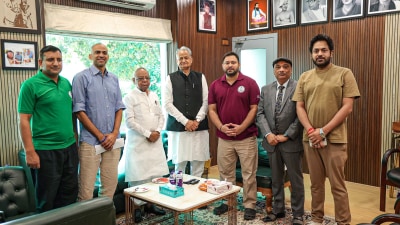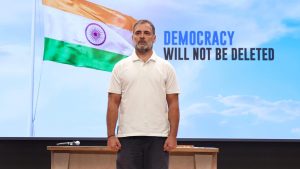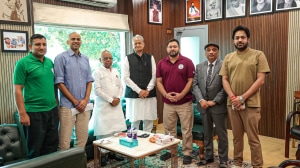Democracy in a dangerous neighbourhood
It's always a joyous occasion when a dictator falls, but even more joyous when it is a democratic process that ends his reign.

It’s always a joyous occasion when a dictator falls, but even more joyous when it is a democratic process that ends his reign. In many years of covering political events, one that remains etched in my memory is the night Indira Gandhi was defeated in March 1977. I remember how ordinary, apolitical people stayed up all night dancing in the streets of Delhi in celebration of her fall. I was not in Pakistan when the results of the election came last week, but I am certain that there would have been celebration in the streets and a general sense that a bad time was coming to an end.
Like all dictators, Pervez Musharraf has a distorted sense of his importance, so he may hang on like a limpet as long as he can, but he is finished. There is no question that he was the main issue in last week’s election and Pakistani voters have shown clearly that they want him to go. It’s time to write his requiem and there are few good things to say. Let me begin with them. When I returned to Pakistan last month, after having been denied a visa for six years, I did see some things that had changed for the better. I saw restaurants in which people could drink a glass of wine without a mullah breathing down their neck and I saw evidence of a large middle class that had not been there before. Islam was less visible in the public square and as someone who thinks religion has no place in the public square I saw this as a good sign.
But the price the Indian sub-continent and the world have paid for these small improvements has been too high. The western media last week was full of articles describing Pakistan as the most dangerous place in the world, and it is. Under Musharraf it became the terrorist capital of the world and only the naive can continue to believe that Musharraf had nothing to do with this. We in India suffered more than any other country as a result of Musharraf’s polices. From the time he failed to conquer Kashmir via his undeclared, cowardly Kargil war, he tried to do it through even more cowardly means — terrorist attacks on unarmed civilians.
Musharraf belongs, in my opinion, to that category of Pakistanis who are obsessed with the idea that India will one day break up and all Pakistan needs to do is to encourage this to happen by continuing to fight an undeclared war against us. So under Musharraf, we saw some of the worst acts of terrorism. The first after Kargil was the hijacking of IC-814. The hijackers and the terrorists Jaswant Singh graciously escorted to Kandahar all found refuge in Pakistan. And the ghastly Maulana Azhar Masood continues to practice his evil trade openly, changing the names of his murderous organisations when they get spotted on the American government’s radar.
Jihadis trained by him and his fellow travellers have blown up Indian temples and trains and killed hundreds of innocent Indians in their cause. All this happened on Musharraf’s watch and, despite his cunning ability to convince George W. Bush, that he is a trusted ally in the global war on terrorism, he convinced nobody in India. Had the jihad not turned on itself and started finding targets in Pakistan, including Musharraf himself, we would probably have paid an even higher price in India because our ‘secular’ government has done nothing to secure us against Islamist terrorism.
Pakistan’s tragedy is that even if the new, democratically elected government changes its policies toward the jihad, the roots now go so deep in Waziristan, Swat, and even Karachi, that it will take much more than a change of policy to end Islamist violence.
Pakistanis like to blame America for what has happened, but the man they should blame is Pervez Musharraf. If more had been done after IC-814, after Daniel Pearl was killed, after the attack on our Parliament, after hundreds died on commuter trains in Mumbai, perhaps Pakistan today would not be considered the most dangerous place in the world.
More was not done and it is the most dangerous place in the world. So is there any hope? Yes there is, and it’s called democracy. Real democracy, in which judges do not get sacked on a whim and lawyers jailed for demanding basic human rights. Real democracy, in which military men in secret backrooms do not continue to ration out fundamental rights and take them back. As far as India is concerned, nothing better could happen than for us to have a stable, democratic Pakistan, because it could be the only way to improve our very dangerous neighbourhood.






- 01
- 02
- 03
- 04
- 05

























